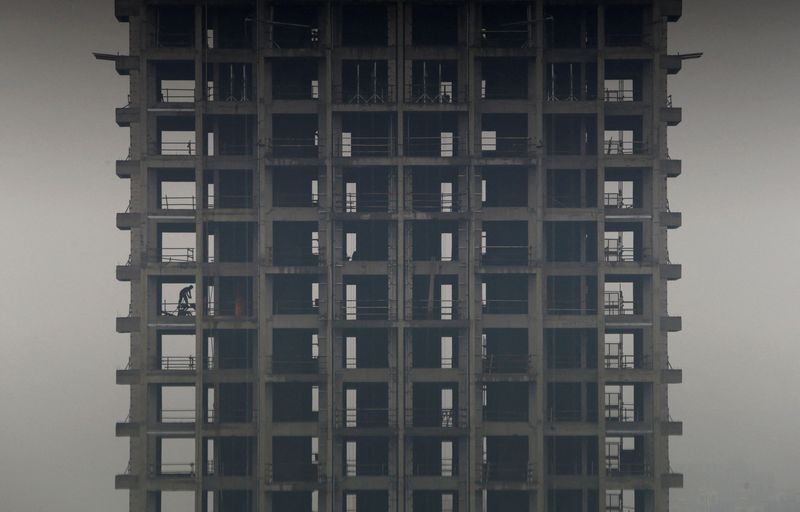By Clare Jim and Xie Yu
HONG KONG (Reuters) - When China's local governments began compiling a "whitelist" of housing projects for loans earlier this year, troubled developers hoped it would open a spigot of credit for a sector that remains a major stumbling block to a broad economic revival.
Four months later, new funding is only coming by the drip, reflecting the deep-seated caution about the outlook for China’s residential property market, according to Reuters interviews with bankers and developers.
Banks have been reluctant to heed Beijing's repeated nudges to bolster credit to the embattled sector given the risks of more bad loans, further undermining confidence in the crisis-hit property market seen as crucial to shoring up a shaky economy.
New loans were only approved since late March, according to the sources, which surprised companies and investors who had expected fresh lending for developers at the start of the 'whitelist' programme months earlier.
The main hurdle to granting more new bank loans is the current weak property market conditions, said Lawrence Lu, managing director at S&P Global Ratings.
"Developers need to have a project in place to get funding ... the issue now is whether the project can generate sufficient cash flow to repay the debt," he said.
At least six defaulted private developers received bank approvals for new loans for "whitelist" projects since late March, according to one company statement, senior executives of two developers and two other people with knowledge of the program. They asked not to be named because of the private nature of the transactions and the sensitivity of the issue.
Those new loans were granted for fewer than a handful of projects and lending received so far was equivalent to hundreds of thousands of dollars per project, three of the people told Reuters.
That's just a drop in the ocean given the vast stock of unfinished housing - a Reuters report in March estimated that the "whitelist" programme covers projects that need fresh financing of 1.5 trillion yuan ($207.51 billion).
The loans are only granted depending on the progress of construction, the three sources said, adding the volume of approval was "insignificant" given the huge number of uncompleted homes.
The Ministry of Housing and Urban-Rural Development and The National Financial Regulatory Administration did not respond to requests for comment.
FROZEN PROJECTS
Since 2022, waves of policy measures have failed to turn around a sector that represents a fifth of China’s GDP and remains a major drag on consumer spending.
The slow roll-out of the “whitelist” lending reflects the challenge facing Beijing which has pushed banks to speed up approvals of new loans to cash-starved private developers to complete their projects.
Under the “whitelist” mechanism launched in January, local governments nominate projects and state-owned as well as commercial banks are encouraged to provide lending.
By March-end, banks had approved the equivalent of $72 billion in loans for 2,100 housing projects, state media reported.
Developers and bankers said many of these approvals restarted existing loans, rather than providing new credit.
Estimates vary widely, but analysts agree there are tens of millions of uncompleted apartments across China after a building boom turned to bust with the failure of developers like Evergrande. There is no public data available on the scale and terms of lending under the “whitelist” policy.
Shanghai-based CIFI Holdings said in a stock exchange filing in late April a project in the southeastern city of Wuhu became its first to be granted new financing equivalent to over $20 million in total.
Sixty-eight of its projects had been shortlisted for the list as of end-April, it said in a statement, while 29 of them had received banks' approval for adjusting existing loans or new loans, allowing it to save 120 million yuan in interest costs a year.
Jinke Property said on its official WeChat account that 83 of its projects had been added to the "white list" as of end-April, while only six of them had received financing. It did not specify if those were existing or new loans. ‘A BAD DEAL’?
One of the six private developers whose projects got bank approval said it had decided not to accept the help.
"We think it's a bad deal because financing incurs interest," a senior executive at the developer told Reuters. "Once we use the 'whitelist' loans we have to complete the construction. However, we're not able to sell all of the units under this bad market so it's only increasing costs for us."
The "whitelist" policy requires loans to be kept in an escrow account for selected projects to ensure their completion. They cannot be redeployed to repay other debts.
Some bankers said they would continue to push back on the "whitelist" directive by negotiating with officials and explaining the shortcomings in some of the projects.
"For banks it's impossible to actively promote such loss-making business. If we did so, we would face the punishment of surging non-performing loans as well," one banker said.
China's central and local governments are pushing ahead with policies intended to clear the stock of unsold housing. Large cities, like Beijing and Shenzhen, have eased home purchase restrictions, and some are allowing homebuyers to "swap" to a new home from an old one.
Private data showed China's average daily home sales during the major May Day public holiday sank 47% year-on-year, following a 45% drop for the whole of April, underscoring the massive task authorities face to spur home purchases.

"There may be a gap between what the market expects versus what is actually happening," said Gary Ng, senior economist at Natixis Corporate and Investment Bank.
"How things are implemented is probably the biggest challenge in the coming months." ($1 = 7.2261 Chinese yuan renminbi)